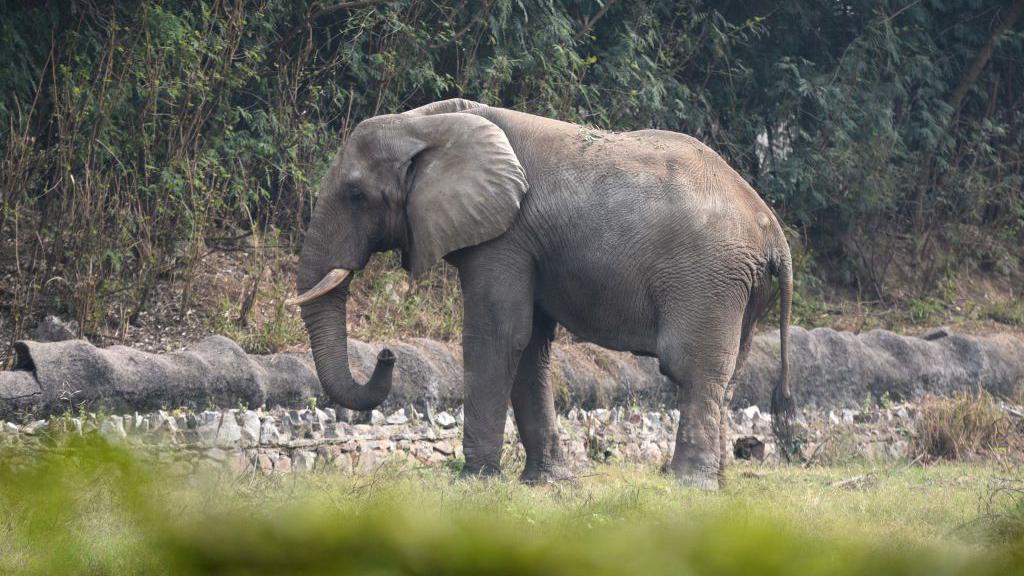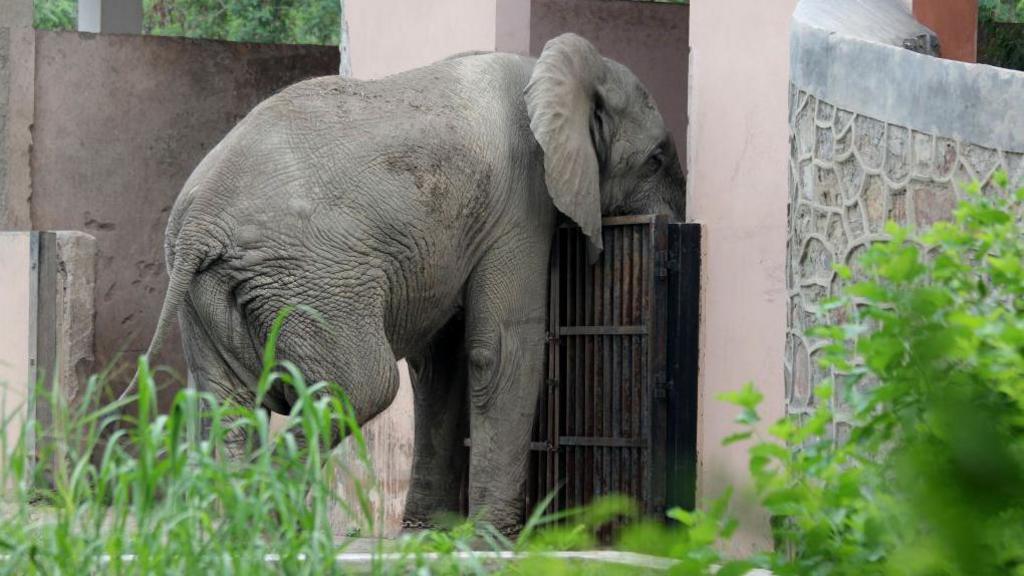The lonely life and death of Delhi's only African elephant

Shankar was among two African elephants that arrived in India in 1998 as a diplomatic gift from Zimbabwe
- Published
Animal welfare activists in India are mourning the death of a much-loved elephant they long sought to rehabilitate.
Shankar, the lone African elephant at Delhi's zoo who spent much of his life in isolation, refused food on Wednesday and collapsed by evening. Despite veterinary efforts, the 29-year-old male died within 40 minutes, officials said.
For 24 years, Shankar endured a lonely existence - including at least 13 spent in solitary confinement.
The cause of his death is not known yet. "Investigation regarding the cause of death has been ordered," zoo director Sanjeet Kumar told BBC.
Shankar was among two African elephants that arrived in India in 1998 as a diplomatic gift from Zimbabwe to former India President Shankar Dayal Sharma.
But Shankar's companion died in 2001, said Mr Kumar.
A former zoo official, who did not wish to be identified, said that after his companion's death, Shankar was temporarily lodged with the Asian elephants in the zoo, but the plan did not work.
"They were very aggressive towards one another," he said, adding that Shankar was soon isolated.
"He [Shankar] was playful when his companion was there. They were popular among zoo visitors. Shankar's behaviour changed after the other African elephant died. Shankar never accepted any other elephant's company, neither did they accept Shankar's. He was left friendless," the former official said.
In 2012, Shankar was shifted to a new enclosure that left him virtually in solitary confinement - despite a 2009 federal ban on keeping elephants alone for more than six months. He remained there until his death.

Shankar's companion died in 2001, leaving him as the only African elephant in the Delhi zoo
For years now, activists have been demanding that Shankar be removed from the zoo and rehabilitated in a wildlife sanctuary that houses other African elephants.
In 2021, a petition in Delhi's high court sought Shankar's relocation to a sanctuary with other African elephants. Two years later, the court dismissed the petition, directing the petitioner to approach the committee handling transfers of wild animals by zoos.
Until Wednesday, Shankar was among the only two African elephants in India's zoos. The other - also an adult male - lives in Mysore zoo in the southern state of Karnataka.
Zoos have long struggled to find mates for the two African male elephants, with efforts stalled by high costs, regulatory hurdles, multiple approvals, and welfare concerns, The Indian Express reported, external.
Activists have also criticised the conditions in which Shankar was kept at the zoo in Delhi, describing his enclosure as bleak and inadequate.
"It's heartbreaking to see him die like this," said Nikita Dhawan, founder of the non-profit Youth For Animals, who had filed the 2021 court petition. "It was easily preventable. He (Shankar) did not have any serious health problems. And he was too young."
The average life expectancy of African elephants is 70 years.
Mr Kumar, the director of Delhi zoo, said that there was "no report of sickness or abnormal behaviour" in Shankar's case till Wednesday morning.
Animal welfare activist Gauri Maulekhi said Shankar's death reflects "years of institutional apathy and neglect" and called it a systemic failure demanding accountability.
"An internal inquiry is simply not enough," Ms Maulekhi told BBC. "This was a systemic failure that demands real accountability and must serve as a watershed moment to end the cruel practice of keeping elephants and other social animals isolated in our zoos for good."
Asked about allegations of neglect, Mr Kumar said "all care and upkeep was followed", but declined to take specific questions.
In October 2024, the World Association of Zoos and Aquariums, suspended the Delhi zoo's membership over concerns about Shankar's living conditions, following reports that he was chained, news agency PTI reported.
The global body gave Delhi zoo until April 2025 to either relocate Shankar or improve his care, warning that its membership would be terminated if the deadline was missed.
A day after the suspension notice, a federal minister inspected Shankar's enclosure and said his health looked better. On 15 October, the government announced plans to bring him a female companion, saying Zimbabwe and Botswana had shown interest and formalities were underway.
Officials in Delhi zoo said that they did not receive any more notices from the global body. And Shankar died before a companion could be arranged.
Follow BBC News India on Instagram, external, YouTube,, external Twitter, external and Facebook, external.